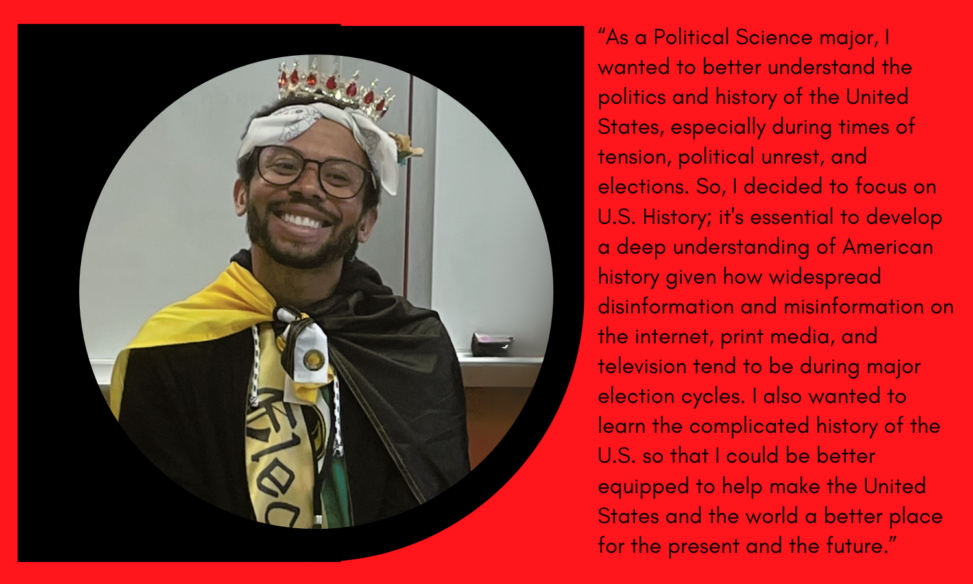I am pursuing a double major in Political Science and History. I love playing video games, sports, reading, and volunteering throughout my community. I’m learning to play the violin and am super proud of that. I’m a military brat who has traveled all over the world, and now, I have found my forever home here in good ole Cincinnati, Ohio.
What brought you to study history at UC?
After I had finished my time in the military, I used the Post 9/11 G.I. bill to attend UC. I started as a political science major and had planned to graduate in 2023. After that, I hoped to attend law school. But I soon realized my heart was not into applying for or attending law school. Throughout my first year of studying political science, I realized many courses echoed or were directly tied to history. So, after talking with my academic advisor in the final weeks of the spring 2023 semester, I decided to pursue a major in history. I’ll graduate in the fall of 2024.
What are you focusing on (so far) in your history major or minor? (i.e., chronological, geographical, or thematic focus, etc).
As a Political Science major, I wanted to better understand the politics and history of the United States, especially during times of tension, political unrest, and elections. So, I decided to focus predominately on U.S. History, especially since it’s essential to develop a deep understanding of it, given how widespread disinformation and misinformation on the internet, print media, and television tend to be during major election cycles. I also wanted to learn the complicated history of the U.S. so that I could be better equipped to help make the United States and the world a better place for the present and the future.
What skills are you picking up from studying history that are coming in handy beyond your history classes?
There are a few skills that I have picked up from studying history, and they will come in handy down the road beyond college. One is being able to analyze information critically, including reviewing the evidence presented, looking at the event that unfolded from multiple perspectives, and making a conclusion based on everything offered. Another skill acquired is understanding people on a more humanist level. History is one of the subjects where you can study people’s direct actions and reactions to events and learn from their successes and failures to make the world a better place. The studia humanitatis (humanistic studies) is a record of who we are; the better we understand and draw from it, the better the world will be.
Have any advice for incoming and prospective history students?
Here’s some crucial advice for incoming history students:
FIRST, READ THE ASSIGNED READINGS.
The readings in history courses are not to be taken lightly. They are the foundation of your learning journey, packed with essential course information. Each class I have taken required me to dedicate time every day of the school week and on weekends to read the assignments. Yes, the readings can be lengthy and sometimes unexciting depending on the class, but all the readings are crucial; I can not stress this enough. Once you grasp the pace of your course load for the semester, make it a habit to spend 2 hours a day to focus on your readings.
SECOND, BE PREPARED TO WRITE A LOT.
With reading comes writing. In some cases, you might be limited to 1000-1200 words to write a paper covering densely packed history aspects; in others, you may have longer paper assignments that require you to analyze and make your argument based on a few sources. No matter the length, writing assignments in history depends on your ability to critically examine the information acquired from the readings and discussions in your classes. Writing in history courses can be a challenge at first, but the sooner you realize that doing and understanding the readings will help you become a better and more direct writer, the more confident you will become.
THIRD, ASK QUESTIONS.
There is no such thing as a “wrong question”; you may not like the answer you get, but there is no such thing as a wrong question. Do not be afraid to speak to your professor out of class or ask questions and answer them in class; don’t worry about making mistakes. Realizing that it is okay to be mistaken and to ask questions when you do not understand something will help you remember that your professors are people who want to help you learn the material and think critically about it. It will also show your professors that you care about your learning as much as they do.
What do you hope to do after college?
After I graduate from UC, my goal is to get into politics and run for governor of Ohio.
What’s your favorite part of studying history at UC so far?
The experience of studying History at UC. This has been one of the most rewarding aspects of my life; going to the University of Cincinnati and studying history is a boyhood dream come true for me.
